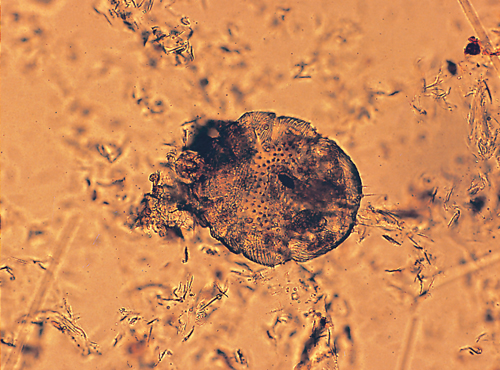Difference between revisions of "Small Mammals Q&A 05"
Jump to navigation
Jump to search
(Created page with "<br style="clear:both;" /> {| align="left" width="100%" style="background-color:#04B4AE" |- | align="center" | 90px|Mansonlogo | align="left" | This ques...") |
|||
| (2 intermediate revisions by one other user not shown) | |||
| Line 3: | Line 3: | ||
|- | |- | ||
| align="center" | [[File:Manson_logo.gif|90px|Mansonlogo]] | | align="center" | [[File:Manson_logo.gif|90px|Mansonlogo]] | ||
| − | | align="left" | This question was provided by [[:Category:Manson|Manson Publishing]] as part of the [[OVAL Project]]. See more [[Category: Small Mammals Q&A|Small Mammals questions]] | + | | align="left" | This question was provided by [[:Category:Manson|Manson Publishing]] as part of the [[OVAL Project]]. See more [[:Category: Small Mammals Q&A|Small Mammals questions]] |
|} | |} | ||
<br><br><br> | <br><br><br> | ||
| Line 20: | Line 20: | ||
*Pinworms cause a localized perianal pruritus. | *Pinworms cause a localized perianal pruritus. | ||
*Neoplasia, such as epitheliotrophic lymphoma, occasionally causes alopecia and pruritus but generally is associated with scaly skin. | *Neoplasia, such as epitheliotrophic lymphoma, occasionally causes alopecia and pruritus but generally is associated with scaly skin. | ||
| − | |l1= | + | |l1= Sarcoptic Mange |
|q2= What diagnostic steps would you take to find the cause of the problem? | |q2= What diagnostic steps would you take to find the cause of the problem? | ||
|a2= Perform skin scrapings, fungal cultures and skin biopsies to determine the cause. | |a2= Perform skin scrapings, fungal cultures and skin biopsies to determine the cause. | ||
| − | |l2= | + | |l2= Sarcoptic Mange#Diagnosis |
|q3= What is the organism shown above and how would you treat it? | |q3= What is the organism shown above and how would you treat it? | ||
| − | |a3= This ''Sarcoptes'' mite was found after a skin scraping. Two to three injections of ivermectin | + | |a3= This ''Sarcoptes'' mite was found after a skin scraping. Two to three injections of ivermectin is usually sufficient to cause resolution of the signs. Insecticidal dips may be too toxic, even diluted, for mice. Use any insecticide product in mice with great caution. |
| − | |l3= | + | |l3= Sarcoptic Mange#Treatment and Control |
|q4= What recommendations would you make regarding the other animals in the household? | |q4= What recommendations would you make regarding the other animals in the household? | ||
|a4= Consider the other mouse an asymptomatic carrier and treat it with ivermectin. Since the dog may not be suffering from allergies but rather a mite infestation, it is important to examine all household pets and people for mites. The household environment should be thoroughly cleaned. | |a4= Consider the other mouse an asymptomatic carrier and treat it with ivermectin. Since the dog may not be suffering from allergies but rather a mite infestation, it is important to examine all household pets and people for mites. The household environment should be thoroughly cleaned. | ||
| − | |l4= | + | |l4= Sarcoptic Mange#Treatment and Control |
</FlashCard> | </FlashCard> | ||
Latest revision as of 12:45, 16 August 2011
| This question was provided by Manson Publishing as part of the OVAL Project. See more Small Mammals questions |
A mouse develops pruritus and hair loss over its dorsum. The skin appears reddened with multifocal crusts and patchy alopecia. Another mouse in the same cage is asymptomatic. There is also a 10-year-old Yorkshire terrier recently diagnosed with allergic dermatitis living in the same household.
| Question | Answer | Article | |
| What are the differential diagnoses for pruritus and alopecia in the mouse? | The causes of pruritus and alopecia in the mouse include ectoparasites, dermatophytosis, bacterial infections, barbering, pinworms and neoplasia.
|
Link to Article | |
| What diagnostic steps would you take to find the cause of the problem? | Perform skin scrapings, fungal cultures and skin biopsies to determine the cause.
|
Link to Article | |
| What is the organism shown above and how would you treat it? | This Sarcoptes mite was found after a skin scraping. Two to three injections of ivermectin is usually sufficient to cause resolution of the signs. Insecticidal dips may be too toxic, even diluted, for mice. Use any insecticide product in mice with great caution.
|
Link to Article | |
| What recommendations would you make regarding the other animals in the household? | Consider the other mouse an asymptomatic carrier and treat it with ivermectin. Since the dog may not be suffering from allergies but rather a mite infestation, it is important to examine all household pets and people for mites. The household environment should be thoroughly cleaned.
|
Link to Article | |
